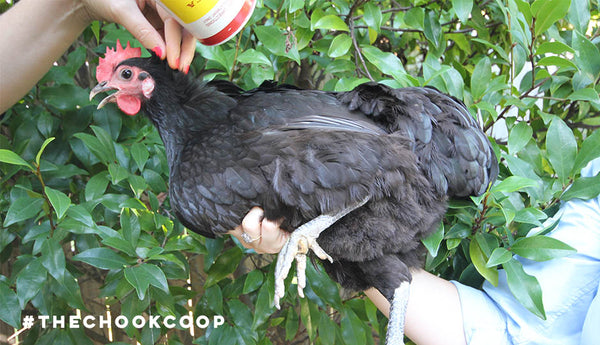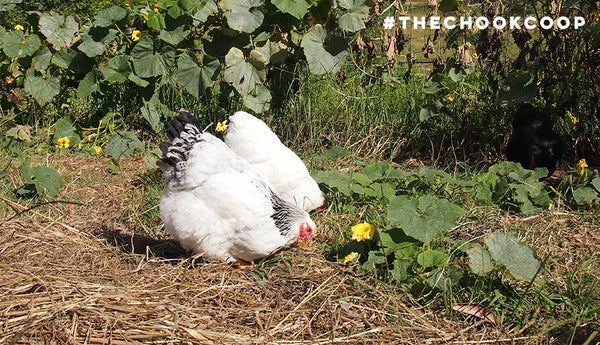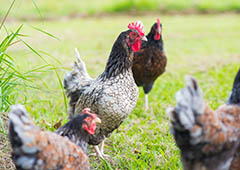Has your flock been sniffling or sneezing a bit more than usual? Perhaps their eyes and nose are looking a little watery. This might mean your flock is having a few respiratory problems.
Respiratory issues in chickens range in severity - some might just be sneezing due to a dusty coop, others may have a more serious illness that requires help from our local vet.
What are respiratory problems usually caused from?
There are a number of different ways chickens can contract respiratory issues. Sometimes, a chickens environment may affect your chickens in a way that looks like they have respiratory issues - when really it’s just a small sensitivity to dust. We all tend to sneeze when there’s a bit of dust in our house - chickens are no different! Common ways chickens can become sick with respiratory problems include:
-
Dust in the coop
Sometimes particles of dust and debris can float around the coop, and cause a few mild symptoms in your chickens. Generally this happens when their coop needs a spring clean, or when new bedding may stir up some debris in the air. The chickens can cough, splutter and get watery eyes if they breathe dust in.
-
Introducing new chickens to an egg-sisting flock
Respiratory illnesses can be contagious - so if you’ve just introduced a new bird to the flock and suddenly noticed the whole coop is coughing, then it’s probably from the new chick! Read more about why you should initially quarantine new birds later in the article.
-
Excess stress
Sometimes, stress can exacerbate mild symptoms chickens already have - sometimes they can even reveal underlying respiratory illnesses. Stress is just bad for chickens in general - and for their chicken keepers! The most common ways chickens become stressed is by having too many flock members for a coop, being overly bored or having a new member dumped immediately on our doorstep.
-
Extreme temperatures
Chickens are hardy creatures, but there comes a point where the temperature takes it toll on your poor chicks. Sickness can be brought on by extreme temperatures if your chickens aren’t protected, or find themselves out in the elements.
Now you know what they’re usually caused from, let’s talk about some signs that your chickens are feeling a bit under the feather.
What are the symptoms?
There are a number of easy to detect symptoms you can observe yourself if your flock are feeling poorly, and are having some problems with their respiratory system. These include:
-
sneezing or sniffling
-
runny nose/mucus coming out of the nose
-
watery eyes
-
swollen sinuses
Anyone who’s had a cold or flu can definitely relate! You should always check your chicks daily to make sure they’re still happily clucking away and that they aren’t showing any symptoms of potential illness.
Are respiratory symptoms and illnesses contagious?
Unfortunately yes - most respiratory illnesses are contagious. The key is, if you notice some of your flock experiencing these symptoms, quarantine the chook away from the other flock members - otherwise your whole coop will be sneezing before you know it!
How are they usually treated?
Mild cases of respiratory illness are generally caused by environmental issues - once those are cleaned up, the symptoms usually clean up quickly too!
Here are some changes to your flock’s environment you can make, that will ensure they breathe easy and stay healthy and happy.
-
Spring cleaning the coop
Giving the coop a good scrub will get rid of any dust and debris that might be giving your chooks grief.
-
Give your chicken a natural spa treatment!
There are a few things you can do to help your poor flock overcome mild respiratory systems. These include:
1. Massaging your birds throat, and offering her a small bit of olive oil.
2. Gently squirt a saline solution in each eye
3. Add some chopped basil, cinnamon, clover, dill and thyme to their feed, or put it in a separate bowl for them to pick at.
-
Change the bedding
Sometimes the bedding we use for the nesting boxes can irritate sensitive chicken’s respiratory systems. Do you usually use wood shavings? Whilst it’s a great choice for easy cleaning, some chickens who are particularly sensitive can be affected by the debris kicked up as they walk or flap. Try something like sand or straw, and see if you notice any differences.
If the symptoms don’t clear up fast, then it’s time to call a vet for advice. They will most likely prescribe you some antibiotics for the whole flock to ensure the illness doesn’t spread. Generally, this medicine is the form of some drops put in the chicken’s water rather than a needle.
Can I do anything to prevent respiratory disease in my chickens?
There are a few housekeeping things you can do to keep respiratory issues at bay. The first is keep the coop clean, which we've mentioned previously as a remedy. Also, keep the stress levels down with your flock, as this can trigger some underlying problems.
Other things you can do include:
-
Quarantine new birds from the flock
If you’ve bought new chickens that you’re adding to a group of existing birds, keep them apart for 30 days - sounds like a long time, but better to be safe than sorry. Monitor the new birds for any symptoms of illness before you introduce them to the coop - it will save you from dealing with a whole flock of sick chicks!
-
Ensure that you don’t have too many chickens in your coop, and that the coop is well ventilated
Too many chickens spoils their health! Make sure you haven’t crammed too many chickens into the coop, as an overcrowded house is a breeding ground for stress. Also, a coop with poor ventilation won’t help with dust and debris in the air. Our Taj Mahal, Penthouse and Mansion coops are all designed with the best ventilation in mind! Also, we tell you the recommended amount of hens.
-
Bolster your chicken’s immune system - naturally
There are a number of natural foods you can add to your chicken’s diet that will keep them fighting fit, and help them stave off illness. They also actually strengthen the chickens respiratory system, so you might be able to prevent symptoms from appearing altogether! These include:
1. Giving them some probiotics - yoghurt (fed sparingly as a treat) is always a great source.
2. Mincing or chopping garlic gloves and adding it to your chicken’s water
3. Adding Apple Cider Vinegar to your chicken’s water
4. Herbs such as dill, oregano and thyme can be added to feed to help respiratory health
-
Buy chickens from trustworthy sources
Breeders who are serious about delivering healthy chickens to the public will really take care of their flock - keeping them in clean, spacious conditions, feeding them nutritious feed and ensuring that they’re at full health when sold. Don’t buy from dodgy operators who don’t tend to their flock well - there’s more of a chance they’ll have some underlying health issues from being kept in a poor environment.
What are some actual respiratory diseases my chickens can get?
We’ll quickly run you through some diagnosable poultry respiratory diseases. These will all be determined by the vet if you’ve seen your chickens displaying some serious respiratory symptoms.
-
Mycoplasma Gallisepticum
This is a bacteria that can cause respiratory issues in your flock. This unfortunately is like glandular fever in humans - once the chickens are affected by this, it’ll be in their system for life. And, like glandular fever, the symptoms will fade with time, and can re-surface if the chicken is excessively stressed. Treatment is usually in the form of antibiotics - definitely one to consult your vet on.
-
Bronchitis
This disease causes respiratory symptoms such as sneezing and watering eyes. It usually occurs in pullets and younger birds. If left untreated, the symptoms can be severe especially in hens, affecting their egg laying capabilities.
-
Infectious Laryngo Tracheitis
This virus is pretty unpleasant - the chicken will start showing the normal symptoms of respiratory illness such as sneezing, watery nose/eyes...and then eventually, if left untreated, there can be a buildup of mucus which causes the chickens severe breathing issues.
So if you’ve noticed a bit of ill health in your flock, usually all it takes is a quick clean and quarantine to sort out the issues and return them to happy chickens! If the symptoms persist or worsen, definitely give your local vet a call.
As chicken keepers, we like to think that we are doing the best we can for our girls, however, there is often more we can do to prevent health issues. I highly recommend the Ultimate Chicken Online Health Course to all my readers! It is written by our friends over at Chickenpedia. They have compiled everything you need to keep healthy chickens through the seasons (which is more than you think!) with a great set of check-lists and downloads to keep.


















